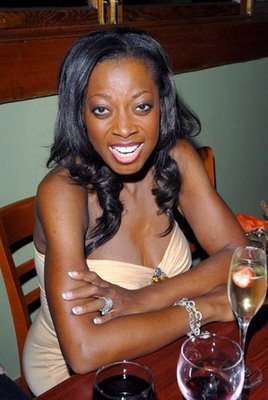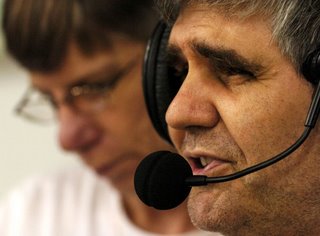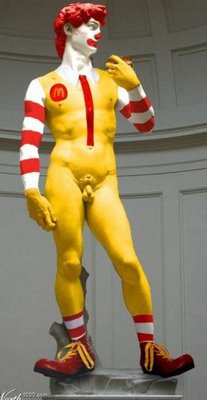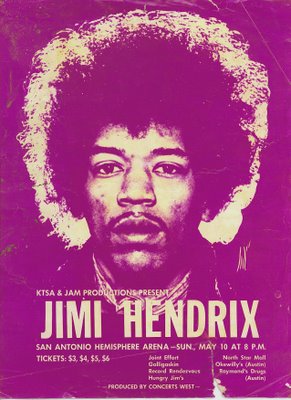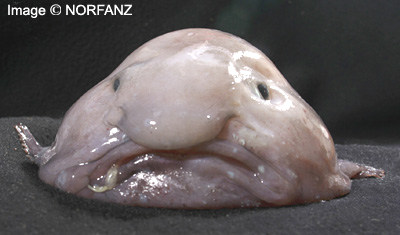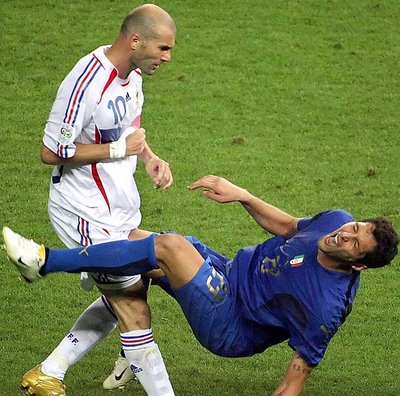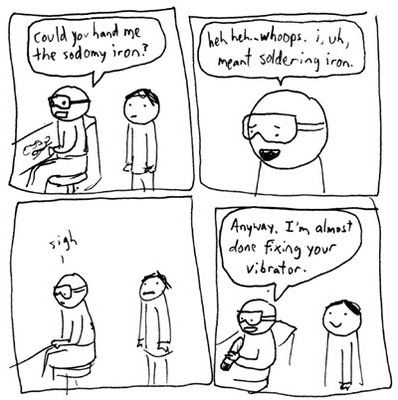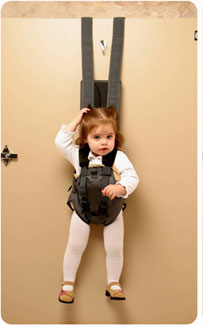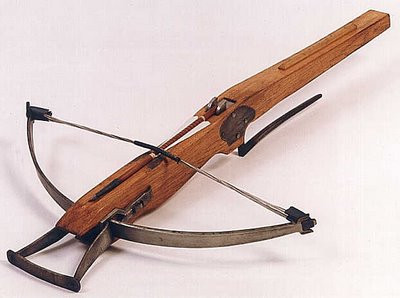
Movies come out on DVD faster than they used to, and indie movies with limited theatrical releases generally reach disc within eight to 12 weeks of their first appearance in theaters. For obscure or difficult or niche-market movies that come and go quickly in a few big cities, Netflix and Amazon now represent their main chance to build an enduring audience.
So here's my completely subjective list of the best, and least appreciated, independent films of 2006 that are already available on video (or will be released by Christmas). Some are still, mysteriously, missing. Where is the horrifying documentary "Darwin's Nightmare"? I have no idea. Why is Jean-Pierre Melville's "Army of Shadows," the best-reviewed rerelease of the year, only available as a European import?
Everything here, with the possible exception of the sleeper hit "Brick," didn't quite find the audience it deserved; some of them, like Russian director Ilya Khrzhanovsky's hallucinatory, indescribable "4," didn't find any audience at all. So damn it all, watch them.
There's bound to be some overlap between this list and my forthcoming top-10 list for the year, so this one is alphabetical and unranked.
"Agnes and His Brothers" This thrilling, angry and disturbing family comedy from German director Oskar Roehler is a mess: It's partly a vulgar sex farce, partly a rip-off of "American Beauty," partly a political satire and partly a Teutonic version of the Almodóvar-style gender-bending melodrama. It might also be a scabrous take on the prevailing cultural climate of post-Wall Germany -- and it might also be the most exciting film I've seen all year. (To be released Dec. 19.)
"Battle in Heaven" Mexican director Carlos Reygadas' contemplative, slow-moving crime saga opens with a remarkably beautiful young woman on her knees in front of a remarkably fat and ugly guy, and she's not giving him a pedicure. The various real-life sex scenes are memorable indeed (and will probably ensure "Battle in Heaven" a long life on DVD) but the real question is whether Reygadas is Latin America's answer to Tarkovsky or a pretentious poseur. I didn't adore this when I first saw it, but its potent images have never left me.
"The Beauty Academy of Kabul" Of all the movies I've seen about the United States' entanglement in the Arab and Islamic worlds over the last three years, none has been stranger, funnier or more enlightening than Liz Mermin's documentary about a group of American stylists and Afghan émigrés who try to set up a cosmetology school in the post-Taliban Afghan capital. (To be released Dec. 19.)
"Brick" Rian Johnson's debut feature, a Hammett-goes-to-high-school noir shot in his (and Richard Nixon's) suburban hometown of San Clemente, Calif., turns out to be more than a one-trick pony. It might be the most sincere reinterpretation of the detective genre in 30 years. Plus, it's sweet, funny and scary in just the right doses.
"Brothers of the Head" I really thought that this film about a pair of conjoined (aka "Siamese") twins who are sold by their dad to a sleazeball promoter and become minor glam-rock legends in mid-'70s England would be trash too. But it's great! Keith Fulton and Louis Pepe's fiction-film debut is a spooky, mysterious movie with a rock 'n' roll heart and dirt under its nails, capturing the anarchic energy of its time and place and making you believe, for a few moments, that something this weird and grotesque could really have happened. (Adapted from the novel by science-fiction legend Brian Aldiss.)
"CSA: Confederate States of America" Kevin Willmott's mockumentary about a contemporary America in which the South has won the Civil War and slavery has continued into the 20th century was castigated in some quarters for its historical inaccuracies and perceived blind spots. Hello! "CSA" is satire, not a careful rendering of alternate history. Some people just didn't want to deal with how funny it is, and how ruthlessly it asks audiences just what our racial attitudes really are.
"The Death of Mr. Lazarescu" An ultra-dark comic journey through the Bucharest night with a lonely, dying Romanian alcoholic, Cristi Puiu's film has been the toast of many festivals, without finding much of a paying audience anywhere. Even calling it a comedy is misleading; "The Death of Mr. Lazarescu," which transpires almost in real time, has a sense of humor closely allied to terror and to compassion. Along the path through many hospital waiting rooms toward Mr. Lazarescu's possible demise (his first name, by the way, is Dante), we encounter an accidental panoply of human dreams and desires. This is the first film in Puiu's series "Six Stories From the Bucharest Suburbs," which might be the most important film event out of Eastern Europe since Krzysztof Kieslowski's "Decalogue."
"The Fallen Idol" For buffs of classic British cinema, nothing else this year approaches the rediscovery of Carol Reed's 1948 drama -- written by Graham Greene! -- about a lonely little boy in a big London house, whose only friend is Baines (Ralph Richardson), the wisecracking butler with a host of adventure tales to tell. It's a mystery but not a ghost story, a tale of subtly shifting loyalties told through Reed's expert point-of-view camerawork and psychological manipulation.
"4" Ilya Khrzhanovsky's extraordinary debut proves that the ironic, self-obsessed, half-crazy spirit of Russian filmmaking is alive and well. "4" begins as an erotic, mysterious mood piece about a group of strangers in a Moscow bar and ends as a grotesque satire of the kind of "village movie" so often made in Russia. In between it's about whores, dogs, the dark side of the meat industry and the secret human cloning project conducted by the Soviet regime under Stalin and Khrushchev. The director may be young, but the script is by veteran Moscow avant-gardist Vladimir Sorokin. (To be released Dec. 12.)
"Gabrielle" Patrice Chéreau, the onetime enfant terrible of the opera world, has grown up into a new identity as a cerebral filmmaker, heir to the vacant Great Man of Cinema throne. This spiny, experimental adaptation of Joseph Conrad's novella "The Return" is an early 20th-century costume drama, but also one that stretches the film medium to the breaking point, with intertitles, silent passages, switchbacks from black-and-white to color, strident modernist music and other trickery. Pascal Greggory and Isabelle Huppert are terrific as the central warring couple, but most of all "Gabrielle" throws down the gauntlet before the rest of contemporary cinema. Not easy to watch, but a great ride for the right kind of viewer. (To be released Dec. 19)
"Lady Vengeance" I know the fanboys won't let me into their party for saying this, but the final installment of Korean filmmaker Park Chanwook's "Vengeance" trilogy, after the acclaimed "Oldboy" and "Sympathy for Mr. Vengeance," is the best, and by far the most serious. With huge Korean star Lee Young-ae as a recently released convict who is plagued by genuine guilt (but still pursuing those who have wronged her), it's more of a character study -- and more cognizant of the genuine costs of violence -- than Park's more charismatic earlier films.
"L'Enfant" Jean-Pierre and Luc Dardenne's latest portrait of down-and-out street life in Belgium's drab industrial cities captured the 2005 Palme d'Or at Cannes -- and as usual that meant absolutely nothing in the United States. Still, this tale of a feckless, likable hustler, the lovely girl he betrays and the baby he sells (all with the best intentions!) is told with remarkable cinematic energy and intensity. Some mavens prefer the Dardennes' other films ("La Promesse," "Rosetta" and "The Son"), but for believers in the European cinematic tradition, this is not to be missed.
"Nathalie" A wicked shape-shifter from the underappreciated French filmmaker Anne Fontaine ("How I Killed My Father"), this one pairs Gallic screen legends Gérard Depardieu and Fanny Ardant as the moving parts in a crumbling marriage. Discovering that her husband is having an affair, Ardant's character hires a sultry, dead-eyed hooker (Emmanuelle Béart) to seduce him. Anything more I might tell you would give the game away; suffice it to say this is a psychological puzzler, terrifically filmed and brilliantly acted, with a dynamite payoff.
"On the Outs" A compelling and compact, if didactic, fable of three young women dealing with post-prison life on the impressively mean streets of Jersey City, N.J. Brilliant starring performance from Judy Marte as a tough-girl drug dealer, and a promising fiction-feature debut from documentarians Lori Silverbush and Michael Skolnik.
"Our Brand Is Crisis" You might not think that a movie about a presidential election in Bolivia would tell you much about American politics. You'd be wrong. Documentarian Rachel Boynton brought her cameras to South America to follow the consultants of Greenberg Carville Shrum, the now-defunct firm headed by former Bill Clinton aides Stan Greenberg and James Carville, as they try to get an American-style reform candidate elected. There are no heroes or villains in Boynton's story, which ends up being fascinating, chilling and tragicomic, with an unexpected conclusion.
"The Road to Guantánamo" Hardly anyone wanted to see Michael Winterbottom's riveting docudrama about the three British Muslims held in Gitmo for three years, and tortured as possible Taliban or al-Qaida fighters, when it first came out. I see no indication that has changed. I mean, now that the Democrats have won the election and U.S. foreign policy has returned to sanity, all that stuff is behind us, right?
"Somersault" Australian director Cate Shortland's debut is about a young girl who runs away from home, hooks up with the wrong guys and gets into trouble. But it also isn't: It's a marvelous landscape picture, capturing an out-of-season ski resort and the lovely face of young Heidi (Abbie Cornish) with the same dispassion. Cornish is an awesome young actress (she's also in the current "Candy") and this movie is one of the year's true discoveries.
"Three Times" So Taiwanese master Hou Hsiao-hsien, darling of the international cinéaste set but virtually an unknown commodity to American moviegoers, finally got one of his films released in the United States. It's a Hou movie all the way, a languorous but intimate love story told in three different eras of recent Chinese history, with the same two actors, Chang Chen and the beautiful Shu Qi, playing the two lovers in each segment. It's lovely and slow-moving, depicting time in its granular, tiny moments and its ungraspable infinitude. So it was a big art-house hit, right? Um, sure.
"Time to Leave" I've been agnostic so far on François Ozon ("Under the Sand" and "Swimming Pool"), who's pretty much the name French director of the moment. But "Time to Leave" is a near-perfect miniature about a shallow Parisian fashion photographer (played by Gallic pretty boy Melvil Poupaud) who learns he has only months to live and must make peace with himself and his family as best he can. It's a tender, heartfelt work that never panders with sentimentality or tries to convince us that mortality makes us morally superior. Shot in CinemaScope, "Time to Leave" is also one of the most spectacular pictorial experiences of the year. (To be released Nov.28.)
"Wassup Rockers" Larry Clark's latest teen docudrama, recounting the almost-real-life adventures of a bunch of Latino skate punks lost among the paler people of Beverly Hills, has a tenderness that's always been near the surface of Clark's work. The sex and drugs are kept to an R-rated level, and Clark seems to have realized, finally, that his audiences are not shocked to learn that today's teens do stuff. So the result is a likable, even zany quality, a rough-and-tumble odyssey told with compassion and humor.
"Zizek!" Directed by onetime Salon contributor Astra Taylor, this irreverent, intelligent documentary explores the life and worldview of Slovenian sociologist and philosopher Slavoj Zizek, who turns out to be a brilliant and mostly comprehensible dude, despite being relentlessly name-checked by the brothers Wachowski throughout the "Matrix" trilogy.
I don't know how widely the new 35mm print of Agnès Varda's 1961 "Cléo From 5 to 7" will play after opening this week at New York's IFC Center. But, God, I hope it comes to your town too, because it sure is wonderful. Out of slight material -- a spoiled actress and pop star, Cléo (Corinne Marchand), wanders the streets of Paris for two hours, distracted and anxious, while awaiting the results of a medical test -- Varda creates a tapestry of city life, and a consideration of mortality, that's joyful, simple, daring and profound.
The long traveling shots from inside the various taxis, cars and buses Cléo rides in are worth the price of admission by themselves. That's not even counting the amazing cafe scene, where she eavesdrops on half a dozen conversations, the even more amazing musical number (written by jazz pianist Michel Legrand, who appears as Cléo's songwriter and rejected lover) or the interlude of silent-film comedy. With its lighthearted experimentation and its magical transformation of a shallow, self-absorbed girl into a romantic heroine, "Cléo" is, for me, above all other films of the French New Wave.
For a radically different vision of French pop culture, try Emmanuelle Bercot's lurid but highly absorbing new film "Backstage," which I caught last spring at the Tribeca Film Festival. Emmanuelle Seigner (that's Mrs. Polanski to you) stars as the icy blond Madonna-style pop idol with an even icier heart who is an object of worship to the lonely small-town girl played by Isild Le Besco. When the idol and her biggest fan are brought together for a trashy reality-TV special, they become entangled in a relationship of mutual dependency.
Most of the twists and turns this twosome takes are familiar -- drug orgies, a shared male lover, overtones and undertones and just plain tones of lesbian obsession -- but Bercot renders the vapid luxury-suite life of stardom in highly convincing detail and both actresses play these mismatched, needy creatures with skin-crawling realism. Photographed by the great Agnès Godard with a lustrous, decadent gloss, "Backstage" offers a fascinating study of pop capitalism in late-stage decline. (Now playing at Film Forum in New York. Opens Dec. 15 at the Nuart Theatre in Los Angeles, Jan. 5 in San Francisco, Feb. 2 in Chicago and Denver, and Feb. 9 in Boston, with more cities to follow.)
What with Richard Linklater's "Fast Food Nation" and Nikolaus Geyrhalter's near-silent new documentary "Our Daily Bread," upscale moviegoers may never wish to eat again. Stuart Klawans, the Nation's excellent film critic, has compared "Our Daily Bread" to Stanley Kubrick's "2001: A Space Odyssey," whereas I was reminded of "The Matrix." A generational difference, I suppose. Whatever your choice of science-fiction comparatives, Geyrhalter's film is a chilling, commentary-free, widescreen study of industrial food production. (He's Austrian, and the film was shot in various countries of Western Europe.)
Yes, much of it is upsetting: We see cows, pigs and chickens slaughtered, as well as sunflowers harvested, farmed salmon sucked through a huge hose, tomatoes and peppers picked via robotic conveyor belt. Whatever your conclusions about that stuff, the really troubling part is the presence of human beings -- almost expressionless in their astronaut suits, rubber boots and goggles -- as they wander through this perfect, antiseptic landscape of death. I was reminded of the late-Marxist philosophical notion that the most important product of industrial capitalism was not the commodities but the workers themselves, and the sense of space and time to which they are conditioned. (Opens Nov. 24 at Anthology Film Archives in New York and Facets Cinematheque in Chicago, with more venues to follow.)
I wanted to like "Opal Dream," the new flick from "Full Monty" director Peter Cattaneo, more than I did, but for fans of Ben Rice's beloved Australian children's novel "Pobby and Dingan," this adaptation will have to do. Young Kellyanne (wonderfully played by Sapphire Boyce) is an odd and sensitive girl stuck in an Outback opal-mining town. Her dad (Vince Colosimo) is accused of "ratting" on another miner's claim (i.e., invading it) -- and now her imaginary friends, Pobby and Dingan, have gone missing! Eventually, "Opal Dream" does deliver its desired emotional payoff, as Kellyanne's predicament reunites the brutally divided town, but it's too bad Cattaneo's direction is so foursquare and sentimental, and most of the acting so hambone-obvious. Certainly this is a sweet-tempered family flick, but Rice's book and its fans, young and old, deserve something more nuanced. (Now playing in New York and Los Angeles. Opens Dec. 8 in San Francisco, Dec. 15 in Minneapolis, Dec. 22 in Denver, Jan. 19 in Chicago and Portland, Ore., and Feb. 2 in Boston, Dallas, Houston, St. Louis and Washington, with other cities to follow.)
My colleague Stephanie Zacharek has already published a wonderful tribute to Robert Altman to mark his unexpected death, and I won't attempt to compete. Suffice it to say that while there will be no more new Altman pictures to see, and that's irredeemably sad, the adventurous and unsinkable grandpa-sprite of indie film will always be with us. His legacy will continue to change, to reverberate throughout the medium, as long as people still make and watch movies.
Altman went out in high style, having recently made his biggest hit (and best film) in decades. He remained his irascible, charming self to the end; when I talked to him by phone last June, he had been feeling poorly but was telling dirty jokes and planning his next picture. An attractive female journalist of my acquaintance told me recently that when she last interviewed him, he jokingly suggested that if she was interested, he was available and the hotel bed was free. (She declined.)
He was perfectly frank about describing "A Prairie Home Companion" as "a movie about death," adding, "Listen, if you can't laugh at death, you really have no right to be here." I summoned the courage to ask him if he was just going to keep working until he dropped dead and he said absolutely, that was the plan.
Altman was jazzed about his planned fiction-film adaptation of the documentary "Hands on a Hard Body." (He had just cast Billy Bob Thornton in a leading role, and was almost ready to go.) Wherever he is right now, I know he's direly disappointed not to be making it. But I also feel confident that he laughed as he departed, laughed in that detached but compassionate Robert Altman way at his own vanity and ours, at the world of movies and people, at the silliness and certainty and beauty of it all.
From an article by Andrew O'Hehir which appeared in Salon.com


